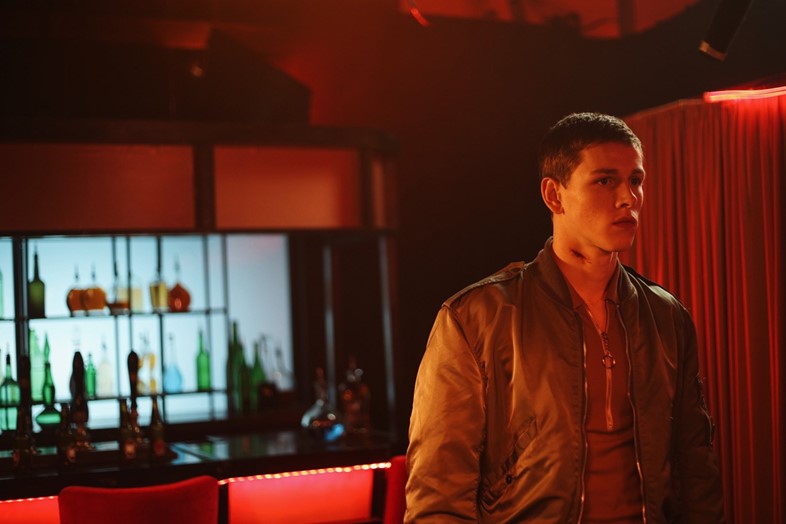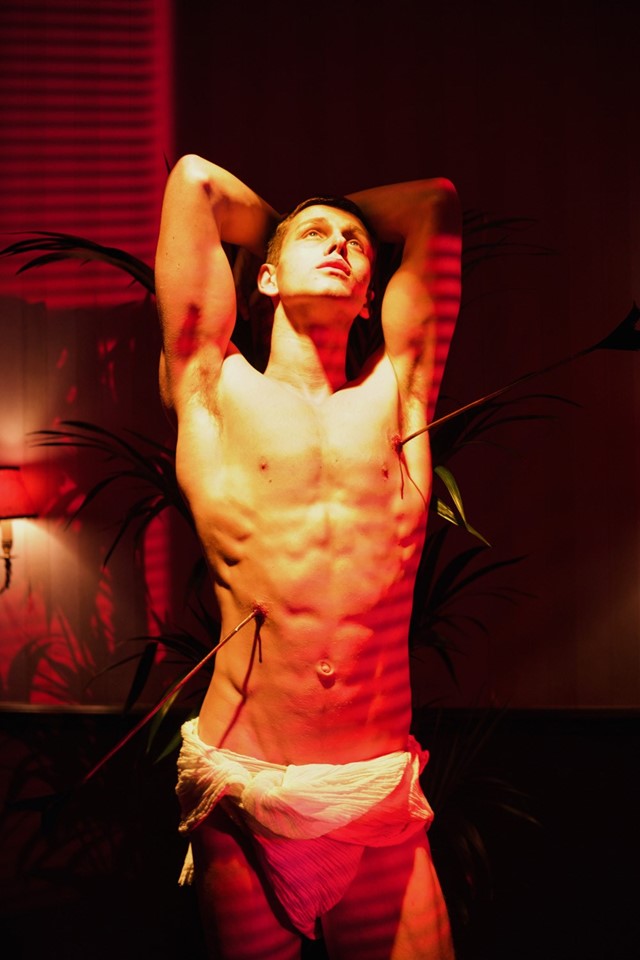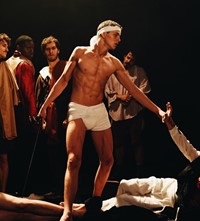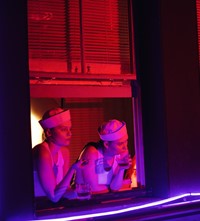The Beach Rats star discusses his new film Postcards From London, which sees him take on the role of a male escort
- TextJack Moss
Harris Dickinson sits in a very normal meeting room in a very normal London office block and insists that his life is really very normal too – despite a rollercoaster two years. “Things haven’t changed,” he says. “I still live in London. I’m still with the same girl. I live close to my family… It’s nice.”
On screen though, it’s a different story. Earlier this year, the 22-year-old starred in Trust, Danny Boyle’s 10-part portrayal of the events surrounding the abduction of oil heir John Paul Getty III (he played the lead, losing 30 pounds in the process). Next year he’ll appear alongside Angelina Jolie in Disney blockbuster Maleficent 2 (“I got to ride horses, I was sword fighting, like... that shit was fun”), and he’s just finished filming Matthias and Maxine, where he will be directed by, and star alongside, much-lauded young French-Canadian auteur, Xavier Dolan (which was “a beautiful experience”).
Before all that was Beach Rats – a portrait of a repressed Brooklyn teen who has sex with older men, which saw him nominated for an Independent Spirit Award – and before that still was Postcards From London, which is only just being released. “I got this before I had even done anything, and I got the lead,” he says of the film, which is a companion to the experimental AIDS-era film Postcards From America (1994), inspired by the autobiographical writings of artist David Wojnarowicz.
Postcards From London begins on similar ground, telling the story of Jim (played by Dickinson) who escapes suburban Essex to London’s Soho and finds himself in the company The Raconteurs – a circle of gay escorts known for their speciality in intellectual post-coital conversations. To become one of them, Jim must enlighten himself on great works of art history – though a rare psychosomatic affliction which causes him to hallucinate in the presence of artworks of true beauty, begins a down-the-rabbit-hole trip into Soho’s neon-lit underbelly. Here, Dickinson opens up about his new role and playing gay characters as a straight man.

Did you know anything about art when you started filming Postcards From London?
Harris Dickinson: Yeah. I’m interested in art and used to paint a lot. I still do. But the script was obviously intriguing, and I was receptive to it. It still felt like a whole new experience, learning about art, and different artists…
I heard the director gave you books to read each day.
Harris Dickinson: Yeah, and DVDs and poetry. I was in my little trailer… well, room [laughs]. And he’d be like: ‘Page 30 is really great, come on man, have a look’. Then I would draw a picture for him and send it to him. It was a lovely exchange, actually…
“If you are playing a gay character there is a certain responsibility to represent it correctly – whether that means representing a struggle, or representing the truth of the situation” – Harris Dickinson
The film captures Jim moving from the suburbs to Soho and being seduced by the city. You grew up in Leytonstone – did you have those same experiences coming central, and going out?
Harris Dickinson: I am kind of a suburban boy, from the outskirts. The place I went to school is more like a village than anything else. It’s disconnected from city life, and is near a forest so I did have that experience of being an outsider coming into London experiencing it with a young, inquisitive nature. I used to skateboard, so I’d discover the city through skating, then galleries and then obviously you get a bit older and nightlife creeps in – bars and clubs, and you start to experience the raw London in its full eclectic beauty…
In both Postcards From London and Beach Rats you play gay characters. How do you feel about taking on queer characters as a straight man?
Harris Dickinson: It’s interesting because if you are playing a gay character, or queer, as you said, there is a certain responsibility to represent it correctly – whether that means representing a struggle, or representing the truth of the situation. For Jim, for example, his sexuality isn’t a question. He knows who he is, and who he likes, loves, and wants to have sexual encounters with – he knows that and that’s not really a part of his journey. A part of his journey is desire and lust for knowledge, and expansion and self-identity. But then Beach Rats is all about struggle, hardship and dealing with stigma and hate crimes, and that’s a different level.

In Postcards you are an object of total male fantasy – even in the blurb you are described as “beautiful”. Did you ever find that weird?
Harris Dickinson: A little bit [laughs]. Not weird, because I knew I was getting myself in for, it played into what the story was about, this idea of transcending beauty. I’m quite good at disconnecting from what it is though. It’s a character, it’s a performance, it’s ultimately allowing the people to just have a bit fun…
You’ve talked in interviews really enthusiastically about the actual art of acting, in a way that not all actors do. What do you love about it?
Harris Dickinson: When I discovered acting, and I was just continually inquisitive and wanted to learn more. I was just so interested and passionate about it. I went to theatre school, I watched films whenever I could, I studied actors and performers… I just know that acting is a form – this sounds a pretentious – but it’s definitely been a form of therapy, of escapism, you know. Of understanding people and society, people around you, and certain insecurities that you have, and that we all have; we all carry insecurities with us and I think that acting has been a strong vehicle for me to figure things out as a young man.
Especially after Beach Rats, people talked a lot about you representing a kind of modern masculinity. What do you think that masculinity means, now? Do you have male role models in your own life?
Harris Dickinson: Big question. I think, growing up with these expectations of what it is like to be a man, or how you are meant to act like a man… I think I had real balance. But everybody goes through it, every girl goes through it – questions of identity, and what it means to be themselves in this world growing up. I was lucky enough to have people around me that encouraged me to be myself, do things that I want. I wasn’t always comfortable with myself. In this current world, people have grown up, and especially my generation, the MySpace generation, getting into MSN, and then Facebook. There are all these set out ideals that obviously are very toxic. But you have to have the foresight and insight to know that they are not what it means to be a man, they are not what it means to be a beautiful woman, or a gay man or a straight man, and I think role models to me have always been people that have inspired me. That could have been my dinner lady in school, who inspired me with her kindness, or my mum, for her tenacity raising us all, or my dad as a social worker, or my acting coaches, who have always been both men and women of all ages.
You often don’t realise all the people who influence the people we become…
Harris Dickinson: We are ever changing as well. Someone said recently in an interview: “we are a work in progress always”. I think it was Jonah Hill or something… But I think we are, we are under maintenance all the time and our society... Our society is dangerous man, it’s dangerous.
Postcards From London arrives in UK cinemas November 23















